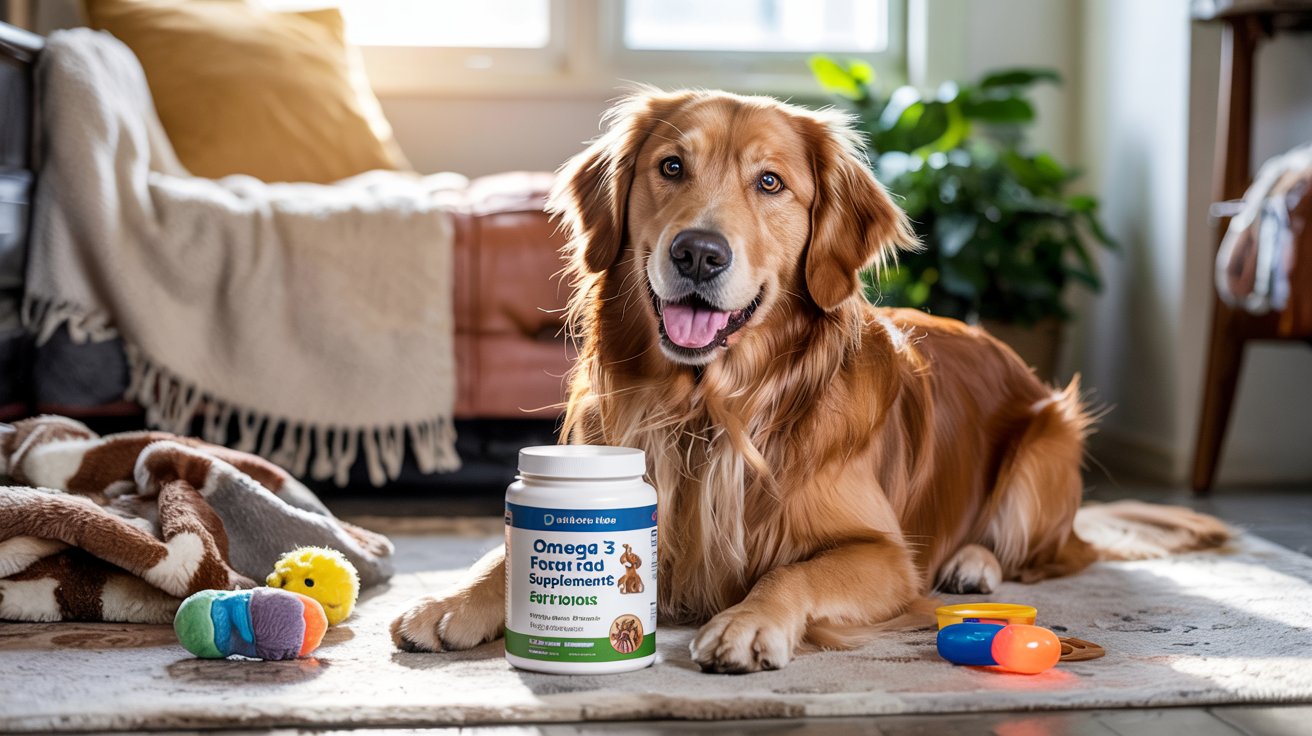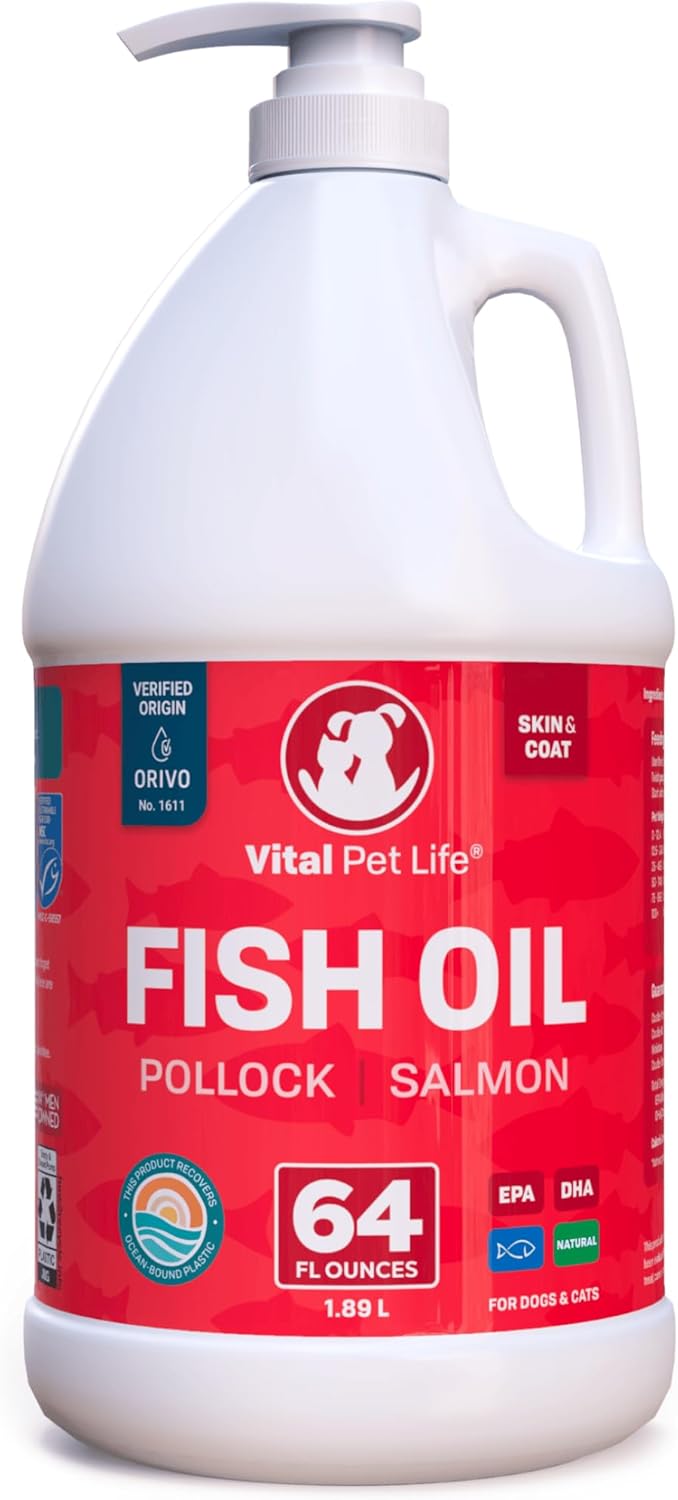If you’re a dog parent, you already know how much joy and love your furry friend brings into your life. But being a responsible pet owner also means ensuring that your dog stays healthy, active, and full of energy. One way to support their overall well-being is by incorporating omega 3 fatty acid supplements for dogs into their diet. These essential nutrients are not just buzzwords—they’re scientifically proven to benefit dogs in numerous ways. Omega 3s can complement other dietary choices, such as novel protein dog food, to provide a balanced and holistic approach to your dog’s nutrition.
In this article, we’ll dive deep into the world of omega 3 fatty acids for dogs, answering questions like can dogs have fish oil? , exploring the benefits of fish oil for dogs, providing practical advice on dosage, and helping you choose the best supplement. Whether you’re looking for ways to improve your dog’s skin and coat or seeking to support their joint health, this guide has you covered. By the end of this article, you’ll be equipped with all the knowledge you need to make informed decisions about your pup’s health. And if you’re ready to take the next step, you can explore our trusted recommendations at Valuedogfood.com.
Let’s get started on the journey to a healthier, happier dog!
What Are Omega 3 Fatty Acid Supplements for Dogs?

Before jumping into why omega 3 fatty acid supplements for dogs are so important, let’s break down what they are. Omega 3s are a type of polyunsaturated fat that plays a critical role in maintaining cellular function and overall health. They include three main types:
- EPA (eicosapentaenoic acid): Known for its anti-inflammatory properties.
- DHA (docosahexaenoic acid): Essential for brain development and cognitive function.
- ALA (alpha-linolenic acid): Found in plant-based sources like flaxseed.
While humans can find omega 3s in foods like salmon or walnuts, dogs often rely on us to provide these essential fats through their diet or supplements. Unlike some other nutrients, omega 3 fatty acids cannot be produced naturally by a dog’s body, which makes them crucial additions to their meals.
Why Are Omega 3 Fatty Acids Good for Dogs?

Imagine if there was one ingredient that could improve your dog’s coat, joints, heart, skin, and even mood. That’s exactly what omega 3 fatty acid supplements for dogs do! Let’s explore the top reasons why these supplements are a game-changer for your four-legged companion.
1. Promotes a Shiny Coat and Healthy Skin
One of the most noticeable effects of adding omega 3 fatty acids to your dog’s diet is the improvement in their coat and skin. Many dog owners report seeing shinier fur and reduced shedding after starting supplementation. This is because omega 3s help reduce inflammation, which can alleviate dryness, itching, and flakiness caused by allergies or environmental irritants. If you ever wondered, if omega-3 fatty acids are good for dogs’ skin?—the answer is a resounding yes!
2. Supports Joint Health
As dogs age, joint issues such as arthritis become more common. The anti-inflammatory properties of EPA and DHA found in omega 3s can significantly reduce stiffness and discomfort in older dogs. Studies show that regular intake of omega 3 for dogs may slow down cartilage degeneration, allowing senior pups to enjoy longer walks and playtime.
3. Boosts Brain Function
Just like in humans, DHA is vital for brain health in dogs. Puppies especially benefit from adequate levels of omega 3s during their developmental stages, as it enhances learning abilities and memory retention. Even adult dogs can experience sharper focus and better behavior when given the right amount of omega 3 fatty acids.
4. Improves Heart Health
Heart disease is a growing concern among dogs, particularly certain breeds prone to cardiac conditions. Research has shown that omega 3s can lower triglycerides and reduce blood pressure, both of which contribute to a healthier cardiovascular system.
5. Strengthens Immune System
A strong immune system means fewer trips to the vet. Omega 3s work wonders in supporting your dog’s natural defenses against infections and illnesses. Plus, they promote faster healing if your dog does get sick or injured.
Can Dogs Have Fish Oil?

Now that we’ve covered the benefits, let’s address a frequently asked question: Can dogs have fish oil? Absolutely! Fish oil is one of the richest sources of EPA and DHA, making it an excellent choice for boosting your dog’s omega 3 intake. However, it’s essential to choose high-quality products specifically formulated for pets. Human-grade fish oil might contain additives or concentrations unsuitable for dogs, so always opt for trusted brands designed with canine needs in mind.
To learn more about safe options, check out our recommendations for the best omega 3 fatty acid supplement for dogs later in this article.
Benefits of Fish Oil for Dogs
Let’s take a closer look at the wide-ranging advantages of fish oil for dogs:
- Reduces inflammation associated with chronic diseases.
- Enhances cognitive performance and slows age-related decline.
- Alleviates symptoms of allergies and skin disorders.
- Supports prenatal and postnatal development in pregnant and nursing dogs.
- Encourages a healthy appetite and balanced metabolism.
Many dog owners notice visible improvements within weeks of starting fish oil supplementation. Take Sarah, for example, whose Labrador Retriever struggled with severe seasonal allergies. After switching to a premium fish oil product, her dog’s constant scratching stopped, and his once-dull coat became glossy again.
How Much Omega 3 Fatty Acids Should I Give My Dog?
When it comes to fish oil for dogs dosage, precision matters. Giving too little won’t yield results while giving too much can lead to side effects like diarrhea or weight gain. Here’s a simple guide to help you determine the appropriate amount based on your dog’s size:
| Dog Weight | Daily Dosage of EPA + DHA Combined |
|---|---|
| Under 10 lbs | 50–75 mg |
| 10–20 lbs | 100–150 mg |
| 21–50 lbs | 200–300 mg |
| Over 50 lbs | 300–600 mg |
Always consult your veterinarian before introducing any new supplement to ensure it aligns with your dog’s specific health requirements. For instance, dogs with pre-existing liver or kidney conditions may require adjusted dosages.
Foods Rich in Omega 3 Fatty Acids for Dogs
While supplements are convenient, incorporating omega 3-rich foods into your dog’s diet is another great option. Some natural sources include:
- Salmon: Packed with EPA and DHA, salmon is a powerhouse dog food. Just make sure it’s cooked thoroughly without seasoning or bones.
- Sardines: These small fish are affordable and loaded with omega 3s. Look for varieties packed in water rather than oil.
- Flaxseeds: Although primarily containing ALA, flaxseeds can still contribute to your dog’s omega 3 intake. Grind them up for easier digestion.
- Chia Seeds: Another plant-based source of ALA, chia seeds can be sprinkled over your dog’s food in moderation.
While these foods are beneficial, they shouldn’t replace professional-grade supplements entirely. For optimal results, consider combining dietary changes with a quality omega-3 fatty acid supplement for dogs.
Choosing the Best Omega 3 Fatty Acid Supplements for Dogs
With countless options available, selecting the best omega 3 fatty acid supplement for dogs can feel overwhelming. To simplify the process, look for the following features:
- High EPA and DHA Content: Avoid products with low concentrations of active ingredients.
- Purity and Safety: Opt for supplements tested for heavy metals and contaminants.
- Third-Party Testing: Reputable brands will have certifications proving their quality.
- Easy Administration: Liquid formulations or soft gels can be mixed into food effortlessly.
For hassle-free shopping, visit Valuedogfood.com to browse our curated selection of top-rated omega 3 supplements tailored to meet your dog’s unique needs.
Step-by-Step Guide to Adding Omega 3 Fatty Acid Supplements for Dogs Diet

Ready to start improving your dog’s health? Follow these steps:
- Consult Your Vet: Get personalized advice based on your dog’s breed, age, and medical history.
- Choose a High-Quality Supplement: Use our guide above to pick the perfect product.
- Introduce Gradually: Start with half the recommended dose and increase over a week to prevent digestive upset.
- Monitor Progress: Keep track of changes in your dog’s coat, energy levels, and overall demeanor.
- Adjust as Needed: Modify the dosage under veterinary guidance if necessary.
FAQs About Omega 3 Fatty Acid Supplements for Dogs
Q1: Is omega-3 fatty acids good for dogs’ skin?
Absolutely! Omega-3 fatty acids help reduce inflammation, combat dryness, and alleviate itching caused by allergies or environmental factors. Many dog owners notice softer, shinier coats and less shedding after introducing omega 3 supplements.
Q2: How much omega 3 fatty acids should I give my dog?
The ideal amount of omega 3 fatty acids for dogs varies based on their size and specific health needs. As a general guideline:
- Small dogs: 50–75 mg of EPA + DHA daily.
- Medium dogs: 100–150 mg.
- Large dogs: 200–300 mg.
- Giant breeds: 300–600 mg. For tailored advice, consult your veterinarian.
Q3: Are there any side effects of omega 3 supplements for dogs?
While omega 3 supplements are generally safe, over-supplementation can lead to mild side effects such as diarrhea, vomiting, or weight gain. Always follow recommended dosages and monitor your dog’s response.
Final Thoughts
Investing in omega 3 fatty acid supplements for dogs is one of the best things you can do for your loyal companion. Whether you’re looking to enhance their coat, ease joint pain, or simply keep them feeling their best, these powerful nutrients deliver unmatched benefits. Remember, consistency is key—regular supplementation combined with a balanced diet sets the foundation for lifelong wellness.
Don’t wait until problems arise; proactive care ensures your dog enjoys a vibrant, happy life. Explore our range of premium omega 3 fatty acid supplements for dogs at Valuedogfood.com today and give your furry friend the gift of optimal health.
By taking action now, you’re not just buying a product—you’re investing in countless tail wags, playful barks, and unforgettable moments with your beloved pup.



